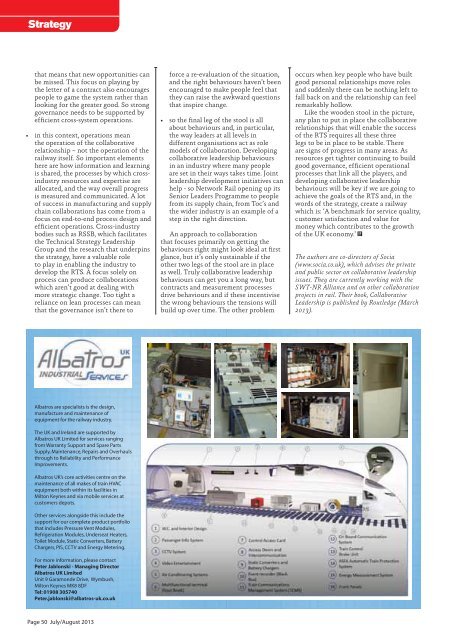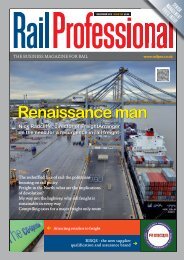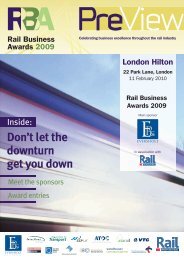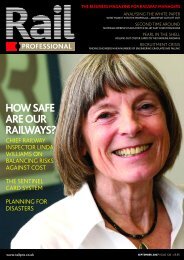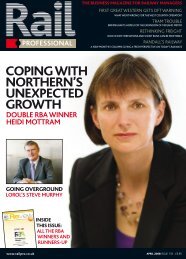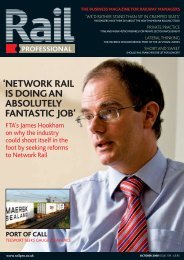View as PDF - Rail Professional
View as PDF - Rail Professional
View as PDF - Rail Professional
You also want an ePaper? Increase the reach of your titles
YUMPU automatically turns print PDFs into web optimized ePapers that Google loves.
Strategy<br />
that means that new opportunities can<br />
be missed. This focus on playing by<br />
the letter of a contract also encourages<br />
people to game the system rather than<br />
looking for the greater good. So strong<br />
governance needs to be supported by<br />
efficient cross-system operations.<br />
• in this context, operations mean<br />
the operation of the collaborative<br />
relationship – not the operation of the<br />
railway itself. So important elements<br />
here are how information and learning<br />
is shared, the processes by which crossindustry<br />
resources and expertise are<br />
allocated, and the way overall progress<br />
is me<strong>as</strong>ured and communicated. A lot<br />
of success in manufacturing and supply<br />
chain collaborations h<strong>as</strong> come from a<br />
focus on end-to-end process design and<br />
efficient operations. Cross-industry<br />
bodies such <strong>as</strong> RSSB, which facilitates<br />
the Technical Strategy Leadership<br />
Group and the research that underpins<br />
the strategy, have a valuable role<br />
to play in enabling the industry to<br />
develop the RTS. A focus solely on<br />
process can produce collaborations<br />
which aren’t good at dealing with<br />
more strategic change. Too tight a<br />
reliance on lean processes can mean<br />
that the governance isn’t there to<br />
force a re-evaluation of the situation,<br />
and the right behaviours haven’t been<br />
encouraged to make people feel that<br />
they can raise the awkward questions<br />
that inspire change.<br />
• so the final leg of the stool is all<br />
about behaviours and, in particular,<br />
the way leaders at all levels in<br />
different organisations act <strong>as</strong> role<br />
models of collaboration. Developing<br />
collaborative leadership behaviours<br />
in an industry where many people<br />
are set in their ways takes time. Joint<br />
leadership development initiatives can<br />
help - so Network <strong>Rail</strong> opening up its<br />
Senior Leaders Programme to people<br />
from its supply chain, from Toc’s and<br />
the wider industry is an example of a<br />
step in the right direction.<br />
An approach to collaboration<br />
that focuses primarily on getting the<br />
behaviours right might look ideal at first<br />
glance, but it’s only sustainable if the<br />
other two legs of the stool are in place<br />
<strong>as</strong> well. Truly collaborative leadership<br />
behaviours can get you a long way, but<br />
contracts and me<strong>as</strong>urement processes<br />
drive behaviours and if these incentivise<br />
the wrong behaviours the tensions will<br />
build up over time. The other problem<br />
occurs when key people who have built<br />
good personal relationships move roles<br />
and suddenly there can be nothing left to<br />
fall back on and the relationship can feel<br />
remarkably hollow.<br />
Like the wooden stool in the picture,<br />
any plan to put in place the collaborative<br />
relationships that will enable the success<br />
of the RTS requires all these three<br />
legs to be in place to be stable. There<br />
are signs of progress in many are<strong>as</strong>. As<br />
resources get tighter continuing to build<br />
good governance, efficient operational<br />
processes that link all the players, and<br />
developing collaborative leadership<br />
behaviours will be key if we are going to<br />
achieve the goals of the RTS and, in the<br />
words of the strategy, create a railway<br />
which is: ‘A benchmark for service quality,<br />
customer satisfaction and value for<br />
money which contributes to the growth<br />
of the UK economy.’<br />
The authors are co-directors of Socia<br />
(www.socia.co.uk), which advises the private<br />
and public sector on collaborative leadership<br />
issues. They are currently working with the<br />
SWT-NR Alliance and on other collaboration<br />
projects in rail. Their book, Collaborative<br />
Leadership is published by Routledge (March<br />
2013).<br />
Albatros are specialists is the design,<br />
manufacture and maintenance of<br />
equipment for the railway industry.<br />
The UK and Ireland are supported by<br />
Albatros UK Limited for services ranging<br />
from Warranty Support and Spare Parts<br />
Supply, Maintenance, Repairs and Overhauls<br />
through to Reliability and Performance<br />
Improvements.<br />
Albatros UK’s core activities centre on the<br />
maintenance of all makes of train HVAC<br />
equipment both within its facilities in<br />
Milton Keynes and via mobile services at<br />
customers depots.<br />
Other services alongside this include the<br />
support for our complete product portfolio<br />
that includes Pressure Vent Modules,<br />
Refrigeration Modules, Underseat Heaters,<br />
Toilet Module, Static Converters, Battery<br />
Chargers, PIS, CCTV and Energy Metering.<br />
For more information, ple<strong>as</strong>e contact<br />
Peter Jablonski - Managing Director<br />
Albatros UK Limited<br />
Unit 9 Garamonde Drive, Wymbush,<br />
Milton Keynes MK8 8DF<br />
Tel: 01908 305740<br />
Peter.jablonski@albatros-uk.co.uk<br />
Page 50 July/August 2013


